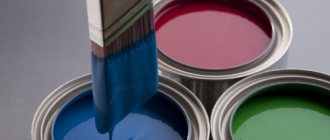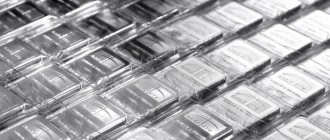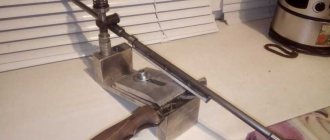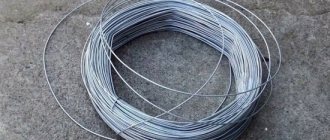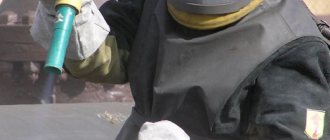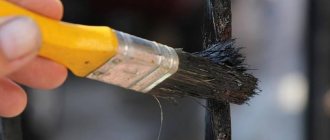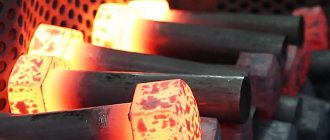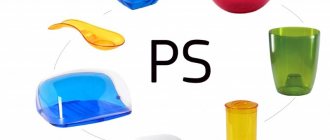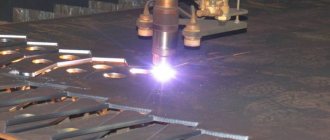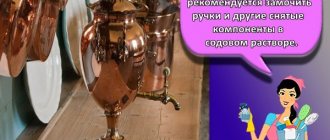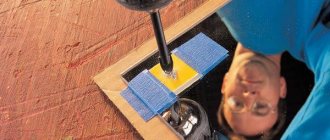Hammer paint is often used on gates, entrance doors, pipes, forged products, etc. It creates a beautiful finish that looks good on similar surfaces. In addition, it serves as excellent protection against the formation of corrosion as a result of environmental influences and mechanical stress. How to dilute hammer paint in order to get the desired result and not worsen the appearance will be discussed below.
Scope of application of hammer paint
By painting the surface with this paint, an imitation of embossing is obtained. Most often it is applied to protect metal from rust; it is used for those items that should have an attractive appearance. For example, designers use it to highlight interior items with metal elements.
Not all formulations can be used indoors; this information should be viewed on the packaging of the specific product.
They are actively used for painting forged structures. This coating makes them aesthetically complete; it is popular to paint fences, doors, and gates with it. It is also used for painting automobile parts, production machines and other similar equipment. But when working, it is important to choose the right product to dilute the paint; not all types are suitable for this purpose.
By painting the surface with this paint, an imitation of embossing is obtained.
Main characteristics
Hammer paints for metal are formed by a combination of acrylic, epoxy and alkyd-styrene substances. To bind them together, crushed fine glass and aluminum powder are used. Liquid dye has a high level of adhesion. Once it hardens, a very strong protective layer appears on the surface of the metal.
The introduction of metal powders increases the strength of the paint coating, but makes this mixture unsuitable for spray application. You will have to work manually (with a brush). Modern samples of hammer paints contain different types of color dyes.
This material is very resistant to temperature changes, so it can be used safely up to 80 degrees Celsius. There is no need to scrupulously clean and prime the rusty surface (while other varnishes, paints and enamels necessarily require such preparation, but even with its careful execution they do not always adhere well and stably).
The painting process is very simple and easy, and the painted layer is not sticky.
Even vibration cannot destroy its layer, and its anti-corrosion properties last for at least 6-7 years. Hammer paint is safe for humans. If you use it to touch up defects in the base coating, the difference in their tone will be barely noticeable.
Features of working with hammer paint
This coloring agent should be applied to a horizontal surface, therefore, when it comes to doors, fences and other surfaces that are located vertically, they should be dismantled and placed vertically, or a more viscous composition with a quick drying time should be selected.
Before applying, you should stir the composition well so that some of the components do not remain at the bottom. You should adhere to an even application, make 2-3 layers, between them you need to wait about 30-40 minutes until the base is dry. Temperatures during work should not be too high; in a home environment, ensure good ventilation.
You should adhere to uniform application, 2-3 layers are made.
Varieties
There are the following types of hammer paint:
ML-165. Produced on an alkyd-styrene base. Characterized by good adhesion and heat resistance (withstands up to +130°C). Suitable for painting any surfaces
Disadvantages include a negative impact on the respiratory system during the application process, as well as a high fire hazard, so precautions must be taken. NTs-221. Designed for decorative purposes, ideal for exterior and interior renovation work, and has a fairly low price
However, it does not protect painted products from corrosion or heat. EP-1323 ME. Epoxy product 2 in 1 (that is, primer and paint). Excellent metal paint with anti-corrosion effect and thermal properties. Used for painting construction equipment, cars, gates, doors, fences. Can be applied to rust and cast iron products. Hammerite. A very expensive and high-quality coloring agent made in England. Made on the basis of alkyd resins and silicone additives, thanks to which the protective effect is significantly enhanced. It is not recommended to apply the composition using a spray gun, since this device will not provide the desired effect and will also increase the consumption of the dye.
Making hammer paint at home
Some craftsmen have gotten used to making hammer enamel themselves. To do this you need to prepare the following ingredients:
- varnish (UVL-1) – 96.8%;
- aluminum shavings – 3-6% – ensures the creation of a hammer effect;
- soot – 0.2-0.5%. This component gives the coating a dark tint;
- silicone oil – forms relief.
Enamel ml-165
The first three components are mixed until the chips stop floating. To change the shade, add colored enamel (no more than 30% of the total mass of the composition). Next, add a few drops of silicone oil. Painting should begin immediately after production. Most often, homemade hammer compounds are used for painting vehicles.
How to choose a solvent
Before thinning hammer paint, you need to select a suitable thinner. The solvent should be selected based on the manufacturer’s recommendations, which are indicated on the packaging. For conventional formulations, toluene or xylene is used.
You cannot use solvents other than those specified by the manufacturer for Hamerite paint. A special diluent has been developed for this composition, which helps improve the properties of the composition. Other products created to dilute paints may worsen the result.
The solvent should be selected based on the manufacturer’s recommendations, which are indicated on the packaging.
Hammer paint tools
For painting work, you can use all the tools intended for this purpose: a roller, a brush, a spray gun, and painting compositions in cans are also available for sale. The roller should be chosen with a fur base; foam rubber can be corroded by paint. If it is necessary to paint vertical products, use a spray gun. It is convenient to paint small surfaces with a spray can.
For painting work, you can use all tools designed for this purpose.
Application methods
Paint can be applied to many surfaces and in several ways - with a roller, brush or spray.
Before painting you need to treat the surface:
- Degrease metal products using white spirit and acetone;
- Then we check the quality using paper - apply it to the metal, for oil stains to appear, repeat the cleaning procedure;
- A smooth and shiny surface should be rubbed with a grinding machine, sandpaper or a wire brush. This is necessary to increase the adhesion of the paint to the surface of the object being painted.
If the enamel is applied to an already painted coating, then you just need to remove dust, dirt and other contaminants, wash with water and dry. And then repaint it.
Tip: If you apply paint to non-ferrous metals, the surface is first primed with a special primer before coating.
Which brush is suitable
A brush is used as a classic method to paint surfaces. It helps to paint hard-to-reach places, but the choice of hammer paint must be made correctly. Regular bristles can crumble when in contact with a similar composition, so it is important to choose high-quality bristles that will withstand painting and will not leave elements on the surface.
It is important to choose high-quality bristles that will withstand painting and will not leave elements on the surface.
Compound
Modern hammer effect paints solve 3 problems simultaneously:
- Rust transformation . Elimination of iron oxides and inhibition of their growth.
- Anti-corrosion priming . Covering the metal with a protective film to ensure adhesion.
- Final enameling . Creation of a stable, leveling layer on the surface.
The composition usually contains the following components:
- Pigments : inorganic dyes with anti-fade properties.
- Binders : acrylic, alkyd resins.
- Solvents : ketone and paraffin compounds.
- Fillers : zinc phosphate, silicone, glass powder, aluminum powder.
It is aluminum powder and a combination of dyes that create a unique hammered texture.
Hammer paint painting algorithm
Coloring is carried out in several stages to obtain a durable result and an even coating. Perform the following steps:
- The surface is cleaned of all types of contaminants; if there is old paint, it is removed and the surface is degreased;
- The paint is mixed; if necessary, it can be diluted with a solvent;
- Apply the composition in an even layer using the selected tool. You need to work at a fast pace, the coating hardens in a short time;
- Each layer should sit for 30-40 minutes to dry, usually 2-3 coats are required.
Complete drying occurs within a day. At this time, mechanical impact on the coating should not be allowed.
Coloring is carried out in several stages to obtain a durable result and an even coating.
Consumption per 1 m²
The component composition of each paint is selected individually, so the consumption per 1 m² often varies. In addition, the application process is influenced by:
Temperature and humidity.
We present in the table the amount of consumption for the products of each popular brand:
| № | Name | Packing | Consumption, ml/m² |
| 1 | Alpina Direct | Can 0.75 l; 2.5 l | 100-120 |
| 2 | Dali 3 in 1 | Can 0.75 l; 2 l | 83 |
| 3 | Dufa Hammerlack | Can 0.75 l; 2.5 l | 142 |
| 4 | Hammerite hammer | Jar 0.25 l; 0.75 l; 2.5 l; 5 l | 100 |
| 5 | Kudo aerosol | 0.52 l can | 520 |
| 6 | Panzer straight to rust | Jar 0.25 l; 0.75 l; 2.3 l | 125 |
The consumption of the composition is indicated taking into account processing in 1 layer. The average value can be taken as 150 ml/m².
Disadvantages of hammer paint
The product also has negative sides, you also need to know them in order to accurately decide whether to choose hammer paint:
- It is difficult to apply on smooth surfaces and embossed areas; if an unpainted area remains, then rust will form in this place, and the entire coating will then be subject to corrosion;
- It is not compatible with other paints and varnishes; if you do not remove the old paint layer well, you will have to deal with hammer curling;
- Difficulty in removing the coating.
If an unpainted area remains, then rust will form in this place, and the entire coating will further be subject to corrosion.
Popular colors and brands
At the dawn of hammer paint, the color scheme consisted mainly of gray shades. Now the number of tinting has increased. The subtitle photo shows the most popular ones. These are white, black, gold and even pink.
As for popular brands, their list looks like this:
- Alpina;
- Dali;
- Dufa;
- Hammerite;
- Kudo;
- Panzer.
The color in the picture may differ from the actual color. Before purchasing, you should ask the store consultant for a sample for an accurate visual assessment.
Advice from the experts
A number of recommendations and advice from experts can make coloring easier. The following tips stand out:
- Do not work with hammer paint at high humidity and temperature;
- It is advisable to paint vertical surfaces with a spray gun;
- It is recommended to sand glossy surfaces before painting;
- The new product must be cleaned of factory grease by thoroughly degreasing the surface.
It is advisable to paint vertical surfaces with a spray gun.
Hammer dyes can give the surface a beautiful and even layer that will protect it from negative environmental factors. But you need to work with it while observing some of the features described in the article.
What it is?
After its introduction, hammer paint was used only in production. Due to its exceptional durability, it has become indispensable for painting equipment operating in adverse conditions. Moisture corroded the frames of machines and machines, and forge paint reliably protected the mechanisms from rust and premature failure.
The vast majority of paints and varnishes adhere well only to specially prepared surfaces. Preparation consists of cleaning and subsequent priming.
The dye “gets along” well with damaged metal, firmly connects with them, and stops the negative process that has begun.
After multi-colored enamels appeared, blacksmith’s dye began to appear in previously inaccessible areas of human activity.
At first, doors painted with them appeared on sale in private homes. Dull dark colors were replaced by original bright colors with sparkles and tints. The first products were so attractive that they simply did not install others in new cottages. Since then, the entrance to each new house has been distinguished by its hammer color.
Demand created supply. The well-proven dye has become widely in demand. This means that a vast field of activity has opened up for designers. And they were not long in coming.
Today, hammer paints and enamels are present on forged products, including:
- fences;
- gate;
- metal furniture;
- sculptural compositions;
- decorative dyes.
The beautiful, durable material has found application inside residential premises and public institutions. Now they process not only metal. Blacksmith paints work well on wood, glass and hard plastics.
It is useless to paint factory products without removing the grease from them. Thus, new sheet steel or rolled steel requires cleaning with white spirit or acetone. For better adhesion, you need to go over the sheets with coarse sandpaper.
